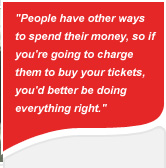




|
|
South Florida CEO magazine February 2006
Staging a Financial Comeback

On
the Prowl: SSE chief operating officer Michael Yormark inside the BankAtlantic
Center in Sunrise .
The Florida Panthers' financial fortunes are on the rise. Fans and sponsors
have returned to the team following a National Hockey League lockout, and the
team's owners have found new ways to derive revenue from the Panthers' arena.
Sunshine Sports and Entertainment (SSE), which owns the Panthers and runs BankAtlantic
Center, the team's Sunrise arena (its name changed from Office Depot Center
in September 2005), is poised to break even in its fiscal year ending June
30, 2006, says Michael Yormark, SSE's chief operating officer. This comes after
losing between $15 million and $20 million annually in fiscal years 2002, 2003
and 2004. Yormark says the company may even earn a profit this year if the
Panthers make the playoffs.
Ironically, the seeds of the Panthers' financial recovery were sown in 2004
and 2005, during a season that never happened. In 2004, NHL players and team
owners locked horns during negotiations for a new players' contract (known
as their Collective Bargaining Agreement). Ultimately, NHL team owners canceled
the 2004-2005 season, "locking out" the players. With its nearly $30 million
hockey payroll slashed to nothing, Yormark says SSE cut its losses to $5.5
million in the fiscal year ending June 30, 2005. At the same time, the company
took steps to boost its revenue, focusing on booking more events for the arena.
"It sounds like they're headed in the right direction," says Patrick Rishe, professor
of sports business at Webster University in St. Louis . "Sunshine Sports has
been around for a while, and their experience is coming to the forefront."
Lower interest rates on some of the company's debt have also cut SSE's expenses.
As a result of refinancing in 2004, SSE received a windfall of about $12 million
and used about $9 million of that sum to pay two years' worth of the company's
debt service payments for the arena. Although Broward County owns the BankAtlantic
Center , SSE has a long-term lease to operate it, and is responsible for paying
off a share of the bonds that financed the arena. SSE used the other approximately
$3 million to build a new 560-seat club area (the WCI Communities Private Club)
in the arena and to install a new electronic sign system, both in hopes of
boosting revenue from club seat sales and sponsorships.
"The unique thing about it [the private club] is that it's all-inclusive. You
get a ticket to almost every event in the building, VIP parking, free food, beer,
wine and soda," Yormark says of the club's appeal.
Yormark adds that the renovated, sold-out club seats cost more than $7,000
per season, bringing in an estimated $4 million in fiscal 2006. That was up
about two-thirds from the $2.4 million those seats brought in, pre-renovation,
during the last year hockey was played (2003-2004).
The aggressive addition of non-hockey events to BankAtlantic Center 's lineup
was key to the prices those new club seats fetched, Yormark says. BankAtlantic
Center is slated to host a total of 197 events - from Rolling Stones concerts
to a Lipizzaner stallion exhibition - during this fiscal year, up 17 percent
from fiscal 2004.
In October 2005, sensing some shows may appeal more in a smaller setting, the
arena opened the Sinatra Theatre presented by BankAtlantic, a self-enclosed
3,000-seat area designed for more intimate shows.
"Given the shows we've had, we guessed right," Yormark says, citing a sold-out
January performance by Johnny Mathis. "There is a trend in the entertainment
business: more and more artists are looking for smaller, more intimate venues."
Kathleen Davis, CEO of Weston-based Sports Management Research Institute,
which has done consulting for SSE, thinks the smaller theater makes sense. "They're
going after a totally different segment from the hockey attendee," she says. "It's
the type of acts that appeal to baby boomers and those above 50. they see that
as an opportunity and are trying to convert it into dollars."
In addition to more concerts and shows, SSE also wants to be the home arena
for more sports teams. Adding teams creates more rental revenue for SSE: maximizing
the use of BankAtlantic Center , creating other sports viewing opportunities
for Panthers season ticket holders, and varying the demographics of spectators
coming to the arena, according to Yormark.
He brought in the American Basketball Association's Florida Pit Bulls, a minor-league
team co-owned by ex-Miami Heat star Tim Hardaway, to play their games at BankAtlantic
Center . The Pit Bulls started playing at the arena in November and have 18
home dates through March, including the league all-star game.
SSE receives rent from the Pit Bulls, and also gets a retainer fee for providing
sales and marketing services to the team, as well as a commission on ticket
and sponsorship sales. Plus Pitt Bulls games attract fans that do not typically
attend hockey games. "It enables us to reach a larger portion of the South
Florida community," Yormark says. He adds that SSE is currently looking for
even more sports teams to play at the arena, including indoor lacrosse and
the Arena Football League.
Rishe sees keeping BankAtlantic Center booked apart from the Panthers games
as a key element of the company's success. "It's critical that folks running
the arena fill it with as many events as possible," he says. "If local businesspeople
see that the managers are keeping it full with quality events, the businesses
are getting much more mileage out of their sponsorships."
To reflect the importance of non-hockey events in its business model, the
company changed its name from Panther Hockey LLP last summer, though the
Panthers remain the company's main holding - its "engine," as Yormark puts
it.
Healthier Hockey?
As for the Panthers themselves, the post-lockout players' contract settlement
gave the team a big financial boost. The NHL instituted a revenue-sharing agreement
to help ailing small market teams. That should bring the Panthers several million
dollars a year in additional revenue.
The Panthers' revenue totaled $60 million in the last season played, 20 percent
lower than the league average of $75 million, according to estimates by Forbes
magazine. The bulk of SSE's revenues comes from sponsorships, luxury suite
and club seat sales, hockey tickets sold and hockey concessions. Other sources
include Panthers merchandise sales, parking fees, rental fees from concerts
and events, and money from the Pit Bulls. Major expenses beside the hockey
team's payroll include other staff salaries, BankAtlantic Center 's debt and
the costs of operating the arena.
One post-lockout change that may help the Panthers be more competitive on-ice,
without raising their expenses, is a new $39 million-per-team salary cap the
NHL adopted; league-wide, players who already had signed contracts agreed to
salary givebacks of 24 percent.
While the Panthers opted to keep their payroll in the same $26 million to $30
million range as before the lockout, that ranks in the bottom third of the
league, Yormark says. The cap now enables the team to become more competitive
on the ice with that same payroll structure, as other teams' payrolls will
come closer to the Panthers'.
"This new economic model created a level playing field for all 30 teams," Yormark
says. "The success of the team will be based not on how much you spend on payroll,
but how you draft and develop players, how good your minor league system is,
how smart you are in signing free-agent players and re-signing your own players."
Hockey experts agree that the new labor agreement will help the Panthers. "It
makes teams like Florida more solvent," Rishe says. "It makes anyone investing
a little more confident in purchasing a sponsorship. The salary cap improves
competitive balance, and that gives sponsors hope that things will turn around
a little bit and give them more exposure. Before it looked pretty bleak."
A competitive team - the Panthers have a strong home record and a chance to
make the playoffs - and rule changes to increase scoring have helped bring
fans back to Panthers games. Average attendance through mid-January was running
10 percent ahead of the 15,936 average for the 2003-2004 season (the arena
can seat 19,250 people for hockey). Yormark says 92 percent of season ticket
holders renewed, and about 1,500 new ones joined - for a total of 9,000.
The Panthers also ran a marketing blitz for this year's season, and left in
place price reductions that they had implemented for most season tickets before
the lost season. The average price of a Panthers ticket this season is $34.31,
eighth lowest in the league, according to Chicago-based sports research group
Team Marketing Report.
"We didn't want to out-price our product," Yormark says. "We are still in a non-traditional
hockey market. The hard-core fan stood by us, but to fill the seats in our building,
we had to get the casual fan."
South Florida is viewed as a non-traditional hockey market because the Panthers
have been around for only 13 of the NHL's 89 years. "There is still some question
whether the markets in the Southeast are good for hockey," says Robert Caporale,
chairman of Game Plan LLC, a Boston investment bank for pro sports.
The Panthers also have doubled their number of sponsors since the lockout to
about 70, Yormark says. He says sponsorship revenue has also doubled, although
he declined to give specific numbers. An intense marketing effort, renewed
enthusiasm for the Panthers after the labor settlement, and SSE's ability to
bring more events to BankAtlantic Center made more companies willing to open
their checkbooks, Yormark adds.
Among the new sponsors is BankAtlantic. The Fort Lauderdale-based bank signed
a sponsorship deal with the team in August 2005, and then agreed to put its
name on the arena a month later. While financial terms of the 10-year naming
rights deal were not disclosed, knowledgeable sources say BankAtlantic agreed
to pay more than the $1.4 million a year that Delray Beach-based Office Depot
Inc. had spent since 2002.
"It was perfect timing for us," BankAtlantic President Jarett Levan says. "We
have been involved with sports marketing for a few years, including the Florida
Marlins and Tampa Bay Lightning. The Panthers have a strong team and a good foundation.
And this is one of very few of these venues available in South Florida . It's
recognized as one of the best centers in the country."
The Panthers' large crowds and the other events at BankAtlantic Center act
as advertising for the marketing-heavy company, introducing potential customers
to the bank. "We're very interested in exposing the brand," Levan says. And
he says SSE has been creative in developing the bank's sponsorship. For example,
BankAtlantic's mascot Seven (the bank is open seven days a week), skates on
the ice between periods.
Even though efforts to turn around the Panthers' finances during the strike
earned the team Street & Smith's Sports Business Journal's Stanley Cup
of Business award last year, there is one factor SSE cannot control: the fickleness
of South Florida sports fans.
"That's an issue the Panthers will continue to have to deal with. I worry about
the South Florida market - I have a home in Miami Beach - because there are so
many other things to do," Game Plan's Caporale says.
At the same time, with Major League Baseball's Florida Marlins threatening
to leave South Florida , the Panthers stand to benefit. "There is a chance
of them catching some of the splintering market from the Marlins," says SMRI's
Davis .
The biggest business obstacle SSE faces, in Caporale's opinion, is BankAtlantic's
proximity to AmericanAirlines Arena in Miami . "The market isn't big enough
to support two facilities with major league teams drawing from the same market," he
says. "Two competing facilities mean that promoters bringing in events can
leverage one building against the other, and they do it well." As a result,
he says,"[SSE] get less money for events."
Yormark shrugs off that issue, noting that BankAtlantic Center consistently
ranks among the top 15 arenas nationwide for ticket sales to non-sports events.
Assessing the Panthers' finances as a whole, he says, "We're probably in the
best financial position since the inception of the franchise." - By
Dan Weil
 |
|
|
|
 |